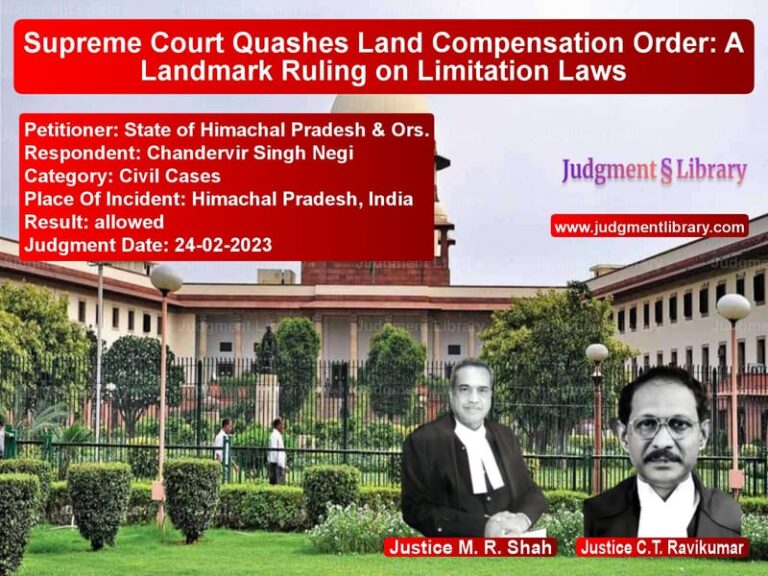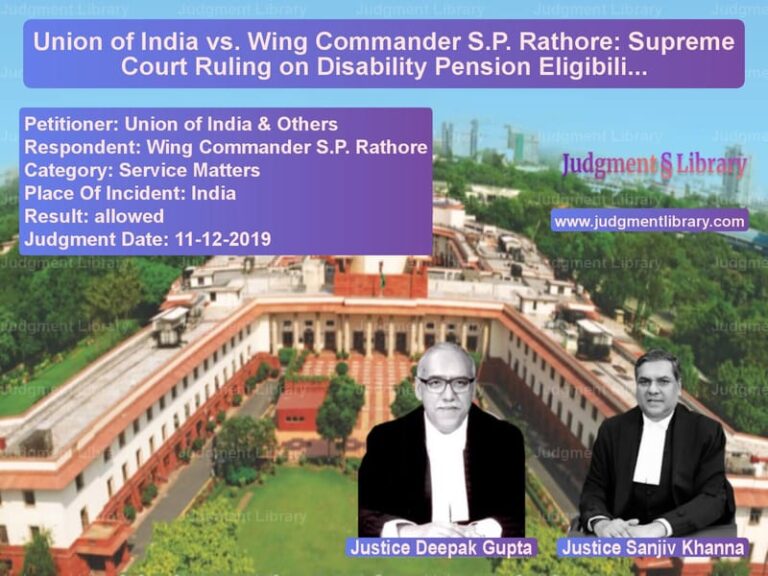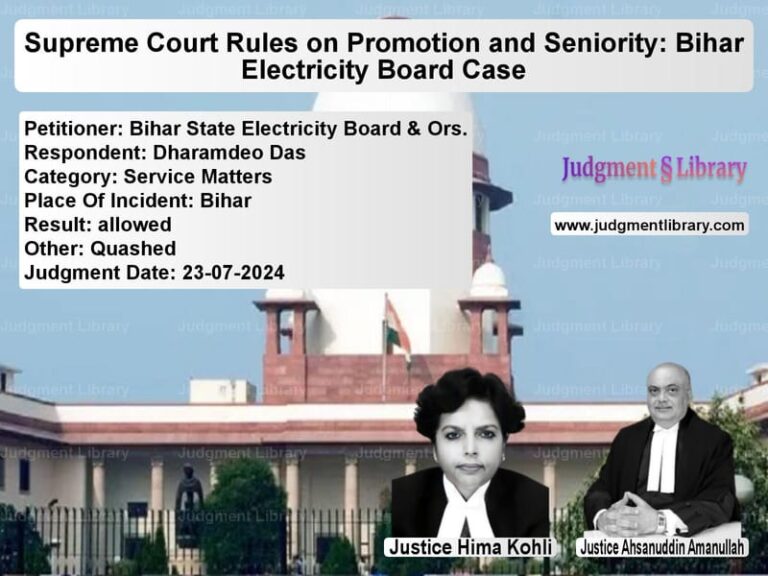NCTE Notification on B.Ed. Qualification for Primary Teachers Quashed by Supreme Court
The Supreme Court has delivered a landmark judgment in the case of Devesh Sharma v. Union of India and Ors., where the main issue revolved around the National Council for Teacher Education’s (NCTE) notification issued on June 28, 2018. This notification made the Bachelor of Education (B.Ed.) qualification eligible for primary school teaching posts (Level-1) despite the previous policy which excluded it. The Rajasthan High Court had quashed this notification earlier, and the Supreme Court upheld that decision, deeming the inclusion of B.Ed. as a qualification for primary level teachers as irrational and inconsistent with the aims of the Right to Education (RTE) Act.
Background of the Case
The case began when the Rajasthan government issued an advertisement for the Rajasthan Teacher Eligibility Test (RTET) Level-1, excluding B.Ed. qualified candidates from eligibility, even though the NCTE’s notification of June 28, 2018, had made B.Ed. holders eligible for primary teacher positions. This led to Devesh Sharma, a B.Ed. qualified candidate, filing a petition before the Rajasthan High Court, challenging the exclusion and seeking to quash the government’s advertisement which did not align with the NCTE’s notification.
Alongside Sharma’s petition, a separate group of petitioners consisting of diploma holders in elementary education (D.El.Ed.) challenged the NCTE notification, arguing that B.Ed. holders should not be allowed to teach at the primary level, as the diploma holders were trained specifically for this purpose.
Legal Proceedings
- 2018: NCTE issues a notification making B.Ed. holders eligible for primary school teacher posts (Level-1), based on the direction of the Ministry of Human Resource Development.
- 2019-2021: The Rajasthan government issues advertisements for the RTET Level-1, excluding B.Ed. holders, which was challenged by various parties.
- November 2021: The Rajasthan High Court quashes the NCTE notification, ruling that B.Ed. holders are not qualified to teach primary classes.
- 2023: The Supreme Court upholds the Rajasthan High Court’s judgment, reinforcing the position that the NCTE’s decision to include B.Ed. as a qualification was flawed.
Arguments by the Petitioner (Devesh Sharma)
The petitioner, Devesh Sharma, argued the following:
- Legal Right to Be Considered for Teaching Post: As per the NCTE’s notification, B.Ed. holders were eligible for primary teacher positions, and Sharma should not have been excluded based on a subsequent advertisement.
- Unconstitutional Exclusion: Excluding B.Ed. holders contradicted the policies and notifications issued by the NCTE and violated his fundamental right to education under Article 21A of the Constitution.
- Policy Decision of NCTE: The decision to include B.Ed. as a qualification was in line with the policy decision made by the NCTE and should have been implemented consistently.
Arguments by the Respondent (Union of India and Others)
The respondents, represented by Senior Advocate Meenakshi Arora, argued:
- Lack of Pedagogical Fit for B.Ed. Qualification: B.Ed. is not designed to equip teachers with the specific skills needed for primary education, and thus, should not be included for primary teacher recruitment.
- Consistency in Policy: The NCTE had consistently excluded B.Ed. holders from primary teaching qualifications until the controversial 2018 notification, which was flawed.
- Policy Decision by the Central Government: The Central Government directed NCTE to amend the qualifications, but such directions should not bypass the educational and pedagogical rationale behind primary school teaching qualifications.
Key Observations by the Supreme Court
The Supreme Court’s observations are crucial in understanding the rationale behind its decision:
1. Pedagogical Qualifications for Primary Teachers
“Primary education is a unique stage in a child’s learning process, and teachers at this level must be equipped with specific pedagogical skills to handle young learners effectively. A B.Ed. qualification, while valuable at the secondary level, does not meet the requirements for primary school teaching.”
The Court noted that primary education requires specific training in child psychology and the development of basic educational skills, which B.Ed. does not provide.
2. RTE Act and Its Mandate
“The RTE Act’s focus on quality education for children up to the age of 14 includes ensuring that teachers at the primary level are adequately trained to provide meaningful education. Including B.Ed. as a qualification goes against the Act’s objective of ensuring quality elementary education.”
The Court highlighted that the intent of the RTE Act was to ensure that the teachers at the primary level are qualified in the specific pedagogical methods suitable for young learners.
3. Procedural and Policy Flaws in NCTE’s Notification
“The NCTE’s decision to include B.Ed. as a qualification for primary school teachers was made under the direction of the Central Government, and it failed to demonstrate an independent expert opinion on the matter.”
Read also: https://judgmentlibrary.com/supreme-court-upholds-rajasthans-mining-lease-allocation-rules/
The Court emphasized that NCTE, as the expert body, should have independently considered the inclusion of B.Ed. holders based on its pedagogical guidelines, rather than just following a policy decision from the government.
4. Unreasonableness of the Policy Change
“The inclusion of B.Ed. as a qualification for primary teachers, without due consideration of the pedagogical requirements for primary education, was an unreasonable policy shift and inconsistent with the RTE Act’s provisions.”
The Court found that the policy change made by the NCTE was not only procedurally flawed but also lacked a rational basis in light of the educational needs at the primary level.
Final Judgment
The Supreme Court ruled:
“The notification dated 28.06.2018 issued by NCTE is quashed. The decision of the Rajasthan High Court stands upheld.”
The Court concluded that the inclusion of B.Ed. as a qualification for primary school teachers was arbitrary and lacked legal and pedagogical justification. The judgment emphasized that the primary school teaching profession should remain dedicated to those who are specifically trained for it, namely those with a D.El.Ed. qualification.
Conclusion
The Supreme Court’s ruling in Devesh Sharma v. Union of India reinforces the importance of maintaining high standards in primary education and ensuring that teachers are adequately trained to meet the needs of young learners. The Court’s decision highlights that the inclusion of B.Ed. as a qualification for primary teachers undermines the pedagogical requirements necessary for effective primary education. This judgment serves as a reminder that policy decisions regarding educational qualifications must be rooted in pedagogical expertise and not solely driven by government directions or administrative convenience.
Petitioner Name: Devesh Sharma.Respondent Name: Union of India and Ors..Judgment By: Justice Aniruddha Bose, Justice Sudhanshu Dhulia.Place Of Incident: Rajasthan.Judgment Date: 11-08-2023.
Don’t miss out on the full details! Download the complete judgment in PDF format below and gain valuable insights instantly!
Download Judgment: devesh-sharma-vs-union-of-india-and-o-supreme-court-of-india-judgment-dated-11-08-2023.pdf
Directly Download Judgment: Directly download this Judgment
See all petitions in Fundamental Rights
See all petitions in Public Interest Litigation
See all petitions in Judgment by Aniruddha Bose
See all petitions in Judgment by Sudhanshu Dhulia
See all petitions in dismissed
See all petitions in supreme court of India judgments August 2023
See all petitions in 2023 judgments
See all posts in Constitutional Cases Category
See all allowed petitions in Constitutional Cases Category
See all Dismissed petitions in Constitutional Cases Category
See all partially allowed petitions in Constitutional Cases Category







